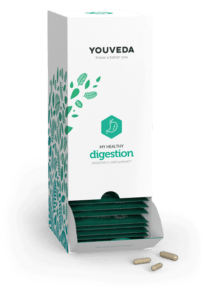You’re about to traipse down a dark alley but your gut tells you no. You hear terrible news, and your tummy acts first by feeling as though it is sinking. Or, when your lover enters the room, butterflies flutter deep inside. Learn about Your Second Brain – Your Gut!

Learn about Your Second Brain – Your Gut!
What is that happening in our guts? Scientists tell us that our gut is our “second brain.”
From the esophagus to the rectum (known as the gastrointestinal tract) there are two linings of over 100 million nerve cells. That’s a lot of nerves — even more than the amount that the spinal cord contains!
The enteric nervous system is part of the autonomic nervous system, meaning that we don’t consciously think about what our body is doing to get it done (digesting or regulating our body temperature, for example). The enteric nervous system (ENS) manages every part of digestion, from when food slips into your esophagus all the way out your colon.
It’s like our gut already has a brain of its own, breaking down foods and squeezing out hormones and acids to keep our body working properly without our say at all!
Serotonin in Our Gut

You know that hormone “serotonin?” Paired with dopamine, these two neurotransmitters are famous for getting you high on love. Serotonin largely impacts our mood, sleep, social and sexual behaviors. It’s been proven that a lack of serotonin leads to depression.
About 90 percent of our body’s serotonin is based in our gut. Additionally, altered levels of serotonin in our gut lead to disease like osteoporosis, cardiovascular issues and irritable bowel syndrome. To further demonstrate how vital serotonin is to our health, get this — the drug Prozac is commonly taken to reduce depression by maintaining a high level of serotonin in your gut.
What about those Butterflies?
Serotonin isn’t the only body chemical living in our guts. Those tingly sensations like butterflies occur when our fight-or-flight response is triggered. When this happens, extra cortisol and adrenaline pulse throughout our bodies. The stomach muscles become smoother and more sensitive, hence why the extra adrenaline and cortisol pumping through our veins creates extra sensation.
Before a big interview or presentation, you may not only experience butterflies, but even nausea. This is because adrenaline temporarily stops blood flowing to organs in your digestion tract, leaving its mess (of food you ate) temporarily unfinished.
Think about your ancestors who got nervous not because of their impending due date for a college essay, but because of a terrifying lion about to rip them apart. Our bodies react the same way to stress they did thousands of years ago by pushing blood from our tummies out into our muscles so we can quickly escape.
The Vagus Nerve
The vagus nerve is one of 12 nerves that carry information from internal organs to the cranial brain. This nerve has many functions, and one of them is to act as the phone line from our belly organs to our head. Another function of the vagus nerve is to communicate between the brain and the diaphragm, which signals us to inhale deeply when under stress. Finally, the vagus nerve controls fear by sending those “gut feelings” of butterflies and belly-dropping sensations from the belly to the brain.
One interesting finding was that about 90 percent of the information transcending between the cranial brain and the gut brain came from the belly up, not the other way around.
Additionally, treatments for depression include stimulating the vagus nerve with electrical current, which shows how much the vagus nerve and the gut really do play a part in our mood.
Emotions from the Gut
Considering how often we look to our gut for intuitive decisions, how quickly our gut knows we are stressed, the amount of serotonin floating around our bellies, and the direction of information running through the vagus nerve, it is no wonder that many scientists suggest that our emotions are probably influenced by the nerves in our gut. Our stomachs are one place where we really feel that rush of hormones triggered when we’re under physiological stress.
People suggest that our two brains talk to each other, so therapies for one will predictably help the other. Before the thought was that depression and anxiety came first, resulting in stomach issues. Nowadays, studies show that it may be the other way around. First comes the irritable gut, then the depressive state.
No matter what comes first, it is clear that what is happening in our bellies plays a vital role in our mood, which affects a huge part of our outlook on life.





